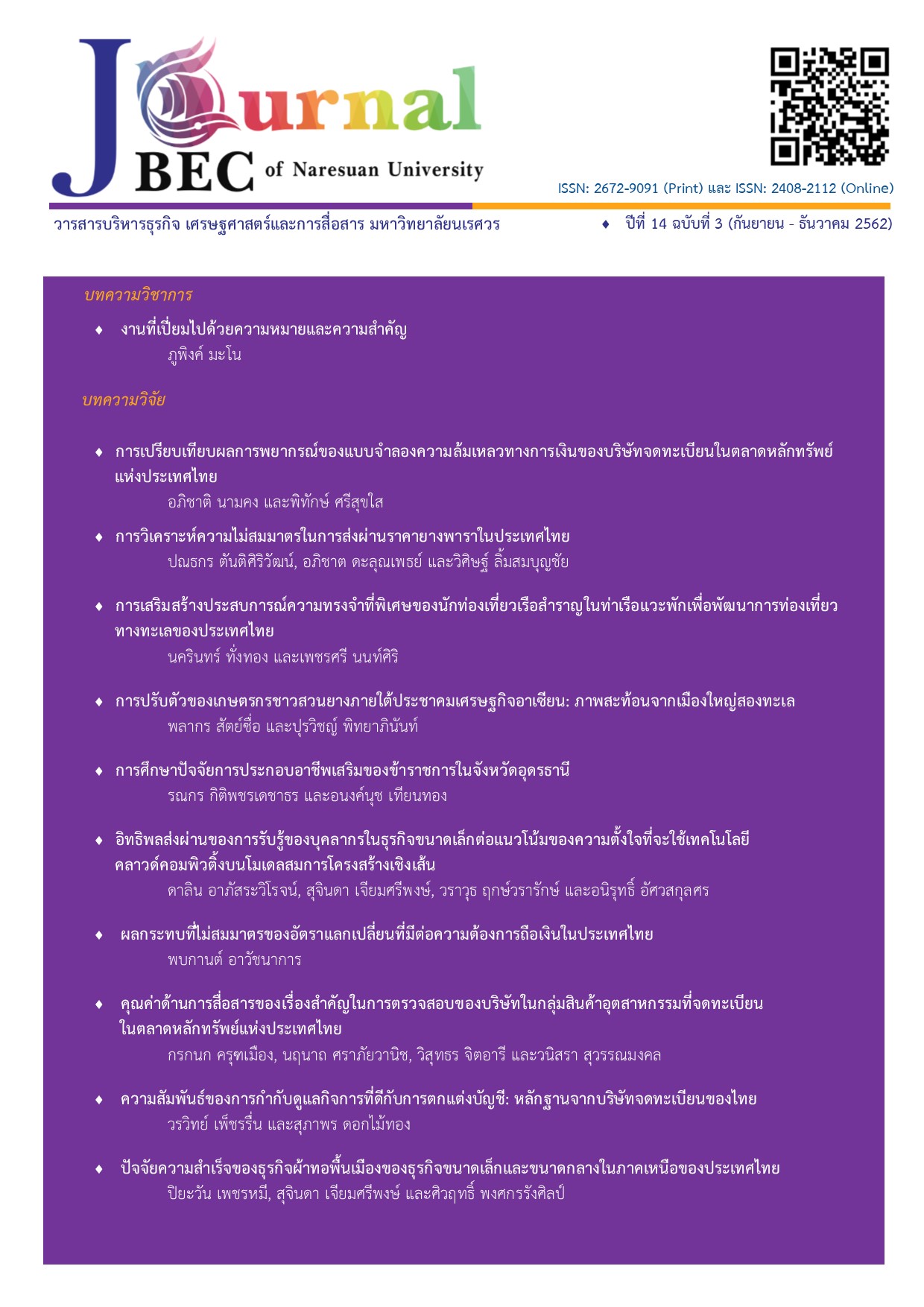งานที่เปี่ยมไปด้วยความหมาย
Main Article Content
บทคัดย่อ
งานที่มีความหมายได้ถูกพิสูจน์แล้วว่าส่งผลประโยชน์ไม่ใช่เฉพาะกับพนักงานแต่กับองค์กรโดยรวม งานวิจัยหลายชิ้นในปัจจุบันได้พุ่งความสนใจไปที่การทำอย่างไรจึงจะเป็นการสนับสนุน หรือสร้างงานให้มีความหมายแก่พนักงาน เนื่องจากพนักงานที่รู้สึกว่างานของตนมีความหมายมีแนวโน้มที่จะมีเป้าหมายชัดเจนมากขึ้น ขยันมากขึ้น และทุ่มเทให้กับองค์กรมากขึ้น งานวิจัยอีกหลายชิ้นได้สนับสนุนว่าเมื่อพนักงานรู้สึกว่างานที่ตนกำลังทำอยู่มีความหมายมีแนวโน้มที่จะมีความพึงพอใจต่องานมากขึ้น รวมทั้งมีความสุขกับชีวิตโดยรวมมากขึ้น บทความชิ้นนี้ได้ทำการทบทวนวรรณกรรมและงานวิจัยที่เกี่ยวข้องเพื่อทำการสรุปถึงขอบเขตขององค์ความรู้ที่มีการศึกษามาแล้วในปัจจุบัน ทั้งความหมายของงานที่มีความหมาย ความสำคัญของงานที่มีความหมาย ปัจจัยที่เอื้อต่อการสร้างงานที่มีความหมาย ปัจจัยที่ทำลายงานให้ไร้ซึ่งความหมาย อีกทั้งยังได้ยกตัวอย่างของการสร้างงานที่มีความหมายผ่านการช่วยเหลือซึ่งกันและกัน เช่นกิจกรรมจิตอาสา หรือการแสดงความรับผิดชอบของสังคม โดยได้หวังว่าจะเป็นการสรุปประเด็นที่มีประโยชน์สำหรับการต่อยอดงานวิจัยในอนาคต รวมทั้งการนำไปประยุกต์ใช้สำหรับองค์กรของทั้งภาครัฐและเอกชนเพื่อสร้างงานที่มีความหมายแก่บุคลากรภายในองค์กรต่อไป
Article Details
References
2. Aknin, L. B., Barrington-Leigh, C. P., Dunn, E. W., Helliwell, J. F., Burns, J., Biswas-Diener, R. and Norton, M. I. (2013). Prosocial spending and well-being: Cross-cultural evidence for a psychological universal. Journal of Personality and Social Psychology, 104(4), 635-652.
3. Allan, B. A. (2017). Task significance and meaningful work: A longitudinal study. Journal of Vocational Behavior, 102(October, 2017), 174-182.
4. Allan, B. A., Batz-Barbarich, C., Sterling, H. M. and Tay, L. (2019). Outcomes of Meaningful Work: A meta-analysis. Journal of Management Studies, 56(3), 500-528.
5. Allan, B. A., Dexter, C., Kinsey, R. and Parker, S. (2018). Meaningful work and mental health: Job satisfaction as a moderator. Journal of Mental Health, 27(1), 38-44.
6. Ariely, D. (2010). Predictably irrational: The hidden forces that shape our decisions.
New York: Harper Perennial.
7. Bailey, C. and Madden, A. (2016). What makes work meaningful or meaningless?. MIT Sloan Management Review, 57(4), 1-17.
8. Bailey, C. and Madden, A. (2017). Time reclaimed: Temporality and the experience of meaningful work. Work, Employment and Society, 31(1), 3-18.
9. Bailey, C., Lips-Wiersma, M., Madden, A., Yeoman, R., Thompson, M. and Chalofsky, N. (2018). The five paradoxes of meaningful work: Introduction to the special Issue ‘Meaningful Work: Prospects for the 21st Century’. Journal of Management Studies, 56(3), 481-499.
10. Bakker, A. B., Schaufeli, W. B., Leiter, M. P. and Taris, T. W. (2008). Work engagement: An emerging concept in occupational health psychology. Work and Stress, 22(3), 187-200.
11. Disney. (2017). Corporate Social Responsibility Update 2017. Retrieved April 4, 2019, from https://www.thewaltdisneycompany.com/wp-content/uploads/2017disneycsrupdate.pdf
12. Edwards, J. R. and Rothbard, N. P. (2000). Mechanisms linking work and family: Clarifying the relationship between work and family constructs. Academy of Management Review, 25(1), 178-199.
13. Fukukawa, K. and Teramoto, Y. (2009). Understanding Japanese CSR: The reflections of managers in the field of global operations. Journal of Business Ethics, 85(1), 133-146.
14. Geldenhuys, M., Laba, K. and Venter, C. M. (2014). Meaningful work, work engagement and organisational commitment. SA Journal of Industrial Psychology, 40(1), 1-10.
15. Grant, A. M. (2012). Giving time, time after time: Work design and sustained employee participation in corporate volunteering. Academy of Management Review, 37(4), 589-615.
16. Greenhaus, J. H. and Beutell, N. J. (1985). Sources of conflict between work and family roles. Academy of Management Review, 10(1), 76-88.
17. theory. Organizational Behavior and Human Performance, 16(2), 250-279.
Herzberg, F., Mausner, B. and Snyderman, B. (1959). The motivation to work (2nd ed.). Oxford, England: John Wiley.
18. Hewitt, A. (2015). Aon Hewitt’s model of employee engagement. Retrieved April 15, 2019, from https://apac.aonhewitt.com/home/resources/thought-leadership/aon-model-of-employee-engagement
19. Jones, D. A., Willness, C. R. and Madey, S. (2014). Why are job seekers attracted by corporate social performance? Experimental and field tests of three signal-based mechanisms. Academy of Management Journal, 57(2), 383-404.
20. Kahn, W. A. (1990). Psychological conditions of personal engagement and disengagement at work. Academy of Management Journal, 33(4), 692-724.
21. Knoop, R. (1994). Work values and job satisfaction. The Journal of Psychology, 128(6), 683-690.
22. Lysova, E. I., Allan, B. A., Dik, B. J., Duffy, R. D. and Steger, M. F. (2019). Fostering meaningful work in organizations: A multi-level review and integration. Journal of Vocational Behavior, 110(February, 2019), 374-389.
23. Macey, W. and Schneider, B. (2008). The meaning of employee engagement. Industrial and Organizational Psychology, 1(1), 3-30.
24. Pinder, C. C. (2014). Work motivation in organizational behavior. New York: Psychology Press.
25. Rodell, J. B. (2013). Finding meaning through volunteering: Why do employees volunteer and what do
es it mean for their jobs?. Academy of Management Journal, 56(5), 1274-1294.
26. Rosso, B. D., Dekas, K. H., and Wrzesniewski, A. (2010). On the meaning of work: A theoretical integration and review. Research in organizational behavior, 30(2010), 91-127.
27. Rothbard, N. P. (2001). Enriching or depleting? The dynamics of engagement in work and family roles. Administrative Science Quarterly, 46(4), 655-684.
28. Supanti, D., Butcher, K. and Sukhabot, S. (lecturer). (25-29 June 2018). Cultivating Meaningful Work: How Corporate Social Responsibility (CSR) Participation Promotes Hotel Employees’ Helping Behaviour. In 8th Advance in Hospitality and Tourism Marketing and Management (AHTMM) Conference (496-505). Bangkok: University of Thai Chamber of Commerce (UTCC) and Washington State University.
29. Supanti, D. and Butcher, K. (2019). Is corporate social responsibility (CSR) participation the pathway to foster meaningful work and helping behavior for millennials?. International Journal of Hospitality Management, 77(January, 2019), 8-18.

